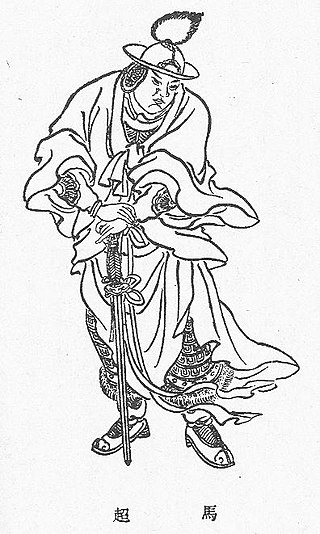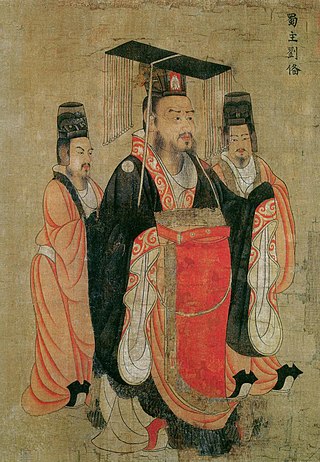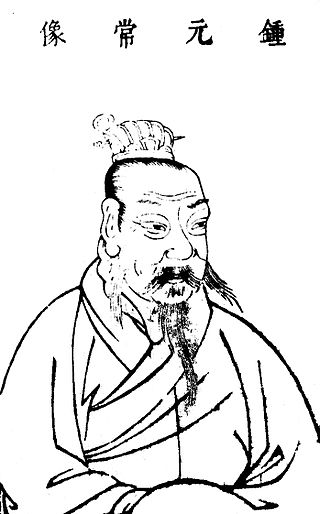Related Research Articles

Ma Chao (176–222),courtesy name Mengqi,was a Chinese military general and warlord who lived in the late Eastern Han dynasty and early Three Kingdoms period of China. A descendant of the general Ma Yuan,Ma Chao was the eldest son of Ma Teng,a prominent warlord in Liang Province. In 211,he formed a coalition with Han Sui and other northwestern warlords and revolted against the Han central government,which was led by the warlord Cao Cao. The coalition broke up after losing the Battle of Tong Pass against Cao Cao's forces. Ma Chao initially retreated,but later returned to attack and seize control of Liang Province by killing the provincial inspector Wei Kang and forcing Wei Kang's subordinates to submit to him. About a year after Ma Chao started his uprising,Emperor Xian issued an imperial decree ordering the execution of Ma Chao's family members,who were in Ye city at the time. In the meantime,Wei Kang's subordinates,led by Zhao Ang,Yang Fu and others,rebelled against Ma Chao and forced him out of Liang Province. Ma Chao retreated to Hanzhong Commandery,where he borrowed troops from the warlord Zhang Lu,and returned to attack Liang Province but was ultimately defeated and driven back. Ma Chao took shelter under Zhang Lu for a while until around 214,when he heard that the warlord Liu Bei was fighting for control over Yi Province with Yi Province's governor,Liu Zhang. He defected to Liu Bei's side and assisted Liu Bei in capturing Yi Province from Liu Zhang. Ma Chao had served as a general under Liu Bei since then and participated in the Hanzhong Campaign in 219. He died in 222.

Liu Bei,courtesy name Xuande (玄德),was a Chinese warlord in the late Eastern Han dynasty who later became the founding emperor of Shu Han,one of the Three Kingdoms of China. Although he was a distant relative of the Han imperial family,Liu Bei's father died when he was a child and left his family impoverished. To help his mother,he sold shoes and straw mats. When he reached the age of fifteen,his mother sent him to study under Lu Zhi. In his youth,Liu Bei was known as ambitious and charismatic. He gathered a militia army to fight the Yellow Turbans. Liu Bei fought bravely in many battles and grew famous for his exploits. Later,he participated in the coalition against Dong Zhuo,following this joined his childhood friend Gongsun Zan and fought under him against Yuan Shao.

Xu Huang,courtesy name Gongming,was a Chinese military general serving under the warlord Cao Cao in the late Eastern Han dynasty of China. He later served in the state of Cao Wei during the Three Kingdoms period under the first two rulers,Cao Pi and Cao Rui,before his death at the start of Cao Rui's reign. Xu Huang is best noted for breaking the siege at the Battle of Fancheng in 219 by routing the enemy commander Guan Yu on the field.

Guo Jia,courtesy name Fengxiao,was an adviser to the warlord Cao Cao during the late Eastern Han dynasty of China. Throughout his 11 years of service,Guo Jia aided Cao Cao greatly with his brilliance and foresight,and his strategies were instrumental to Cao Cao's triumphs over rival warlords such as LüBu and Yuan Shao. For example,four years before Cao Cao's decisive victory over Yuan Shao at the Battle of Guandu,Guo Jia already foresaw that Cao Cao would win when he pointed out ten advantages Cao Cao had over Yuan Shao.

Pang De,courtesy name Lingming,was a Chinese military general who lived during the late Eastern Han dynasty. He started his career under the warlord Ma Teng,who was based in Liang Province. In 211,Ma Teng's son Ma Chao,along with a coalition of warlords from Liang Province,started a rebellion against the Han central government,which was controlled by the warlord Cao Cao. After Cao Cao defeated Ma Chao and the coalition at the Battle of Tong Pass,Ma Chao fled to Hanzhong Commandery and took shelter under the warlord Zhang Lu. Pang De accompanied him to Hanzhong. When Ma Chao defected from Zhang Lu's side in order to join the warlord Liu Bei,Pang De remained in Hanzhong and eventually came to serve Cao Cao after Cao Cao defeated Zhang Lu at the Battle of Yangping and took over Hanzhong. In 219,Pang De fought at the Battle of Fancheng under Cao Ren's command against Liu Bei's forces led by Guan Yu. Pang De was captured in battle and eventually executed by Guan Yu when he refused to surrender.

Pang Tong (179–214),courtesy name Shiyuan,was a Chinese politician who served as the key adviser to the warlord Liu Bei in the late Eastern Han dynasty of China. In his youth,Pang Tong was disregarded because he was plain looking,however Sima Hui highly esteemed him calling him the "Crown of Scholars in Jing Province". He studied under him along with Zhuge Liang,Xu Shu and Xiang Lang and was given the nickname of "Fledgling Phoenix". Because of his friendly attitude,he worked as an appraiser in Nan Commandery. When reviewing someone,he would prioritize their virtue over their abilities and would encourage them to help others.
Li Dian,courtesy name Mancheng,was a Chinese military general and politician serving under the warlord Cao Cao during the late Eastern Han dynasty of China. He participated in the Battle of Guandu in 200 between Cao Cao and Yuan Shao. He also played a significant role in the defence of Hefei during the Battle of Xiaoyao Ford of 214–215 against the forces of Sun Quan.

Xun You,courtesy name Gongda,was a statesman who lived during the late Eastern Han dynasty of China and served as an adviser to the warlord Cao Cao. Born in the influential Xun family of Yingchuan Commandery,Xun You was recruited into the civil service by the general He Jin. When the warlord Dong Zhuo hijacked and controlled the Han central government between 189 and 192,Xun You plotted with four others to assassinate him but was discovered and imprisoned. Following his release after Dong Zhuo's death,he wanted to serve as the Administrator of Shu Commandery but eventually settled as an official in Jing Province.

Jia Xu,courtesy name Wenhe,was an official of the state of Cao Wei during the early Three Kingdoms period of China. He started his career in the late Eastern Han dynasty as a minor official. In 189,when the warlord Dong Zhuo took control of the Han central government,he assigned Jia Xu to the unit led by Niu Fu,his son-in-law. In May 192,after Dong Zhuo was assassinated by LüBu,Jia Xu advised Li Jue,Guo Si and Dong Zhuo's loyalists to fight back and seize control of the imperial capital,Chang'an,from a new central government headed by LüBu and Wang Yun. After Li Jue and the others defeated LüBu and occupied Chang'an,Jia Xu served under the central government led by them. During this time,he ensured the safety of the figurehead Han emperor,Emperor Xian,who was being held hostage by Li Jue. He also attempted to prevent internal conflict between Li Jue and Guo Si,but with limited success. After Emperor Xian escaped from Chang'an,Jia Xu left Li Jue and briefly joined the general Duan Wei before becoming a strategist of the warlord Zhang Xiu. While serving under Zhang Xiu,he advised his lord on how to counter invasions by the warlord Cao Cao,who had received Emperor Xian in 196 and taken control of the central government. In 200,during the Battle of Guandu between Cao Cao and his rival Yuan Shao,Jia Xu urged Zhang Xiu to reject Yuan Shao's offer to form an alliance and instead surrender to Cao Cao. Zhang Xiu heeded his advice. Jia Xu then became one of Cao Cao's strategists.
Xun Chen,courtesy name Youruo,was an official who lived during the late Eastern Han dynasty of China. Born in the influential Xun family of Yingchuan Commandery,he was the fourth brother of Xun Yu and a second cousins once removed of Xun You. He initially served as an adviser to the warlord Han Fu and later to another warlord,Yuan Shao.

Zhong Yao,also referred to as Zhong You,courtesy name Yuanchang (元常),was a Chinese calligrapher and politician who lived during the late Eastern Han dynasty and Three Kingdoms period of China. He served in the state of Cao Wei during the Three Kingdoms period. His calligraphy was highly regarded as he was known as one of the Four Worthies of Calligraphy (書中四賢) in the history of Chinese calligraphy.
Cui Yan (165–216),courtesy name Jigui,was a Chinese politician serving under the warlord Cao Cao during the late Eastern Han dynasty of China. In his early life,he served briefly in the local district office before leaving home to study under the tutelage of the Confucian scholar Zheng Xuan. In the late 190s,Cui Yan became a subordinate of the northern warlord Yuan Shao but did not make any significant achievements under the latter,who ignored his suggestions. Following Yuan Shao's death in 202,Cui Yan was imprisoned when he refused to help either of Yuan's sons—Yuan Shang and Yuan Tan—in their struggle over their father's territories. After he was freed,Cui Yan came to serve under Cao Cao,the de facto head of the Han central government. Throughout his years of service under Cao Cao,Cui Yan performed his duties faithfully and diligently,maintaining law and order within his bureau and recommending talents to join the civil service. In 216,in an incident widely regarded as a case of grievous injustice,Cui Yan was accused of defaming Cao Cao in a letter and ended up being stripped of his post,thrown into prison and subsequently forced to commit suicide.
Xin Ping,courtesy name Zhongzhi,was a Chinese official who served under the warlords Han Fu,Yuan Shao and Yuan Tan during the late Eastern Han dynasty.
Liu Yao (157–198),courtesy name Zhengli,was a Chinese politician and warlord who lived during the late Eastern Han dynasty of China. He was a descendant of Liu Fei,the eldest son of the Han dynasty's founding emperor,Liu Bang. When he was 18,he became famous after rescuing a relative who was being held hostage by bandits. He started his career in the Han civil service after being nominated as a xiaolian,and was known for his incorruptibility. In 194,although he was appointed by the Han imperial court as the governor of Yang Province,he barely managed to gain a foothold over his jurisdiction because the warlord Yuan Shu controlled a large part of the territories around the Huai River region in Yang Province. In 195,conflict broke out between Liu Yao and Yuan Shu,who sent his ally Sun Ce to attack Liu Yao. Sun Ce defeated Liu Yao and forced him to retreat south into present-day Jiangxi,where Liu Yao defeated a minor warlord Ze Rong and died of illness shortly later. His elder brother was Liu Dai,another prominent warlord.
Gao Gan,courtesy name Yuancai,was a minor warlord who lived during the late Eastern Han dynasty of China. He was a maternal nephew and subordinate of the warlord Yuan Shao.
Xin Pi,courtesy name Zuozhi,was an official of the state of Cao Wei during the Three Kingdoms period of China. Along with his elder brother Xin Ping,he started his career in the late Eastern Han dynasty as an adviser to the warlord Yuan Shao. Following Yuan Shao's death and a power struggle between Yuan Shao's sons Yuan Tan and Yuan Shang,Xin Pi initially sided with Yuan Tan but later defected to Yuan Shao's rival Cao Cao,while seeking Cao Cao's aid on Yuan Tan's behalf in the fight against Yuan Shang. As a result,his family members were executed by Shen Pei,a Yuan Shang loyalist who blamed Xin Pi for the downfall of the Yuan family. After avenging his family,Xin Pi served as an official under Cao Cao,who controlled the Han central government and the figurehead Emperor Xian. After the Cao Wei state replaced the Eastern Han dynasty,Xin Pi continued serving under Cao Cao's successor Cao Pi,the first Wei emperor,and later under Cao Rui,Cao Pi's son. Throughout his service in Wei,he was known for being outspoken and critical whenever he disagreed with the emperors and his colleagues. His highest appointment in the Wei government was the Minister of the Guards (衞尉). He died around 235 and was survived by his son Xin Chang and daughter Xin Xianying.

The Battle of Tong Pass,also known as the Battle of Weinan,was fought between the warlord Cao Cao and a coalition of forces from Guanxi between April and November 211 in the late Eastern Han dynasty of China. The battle was initiated by Cao Cao's western expansion,which triggered uprisings in Guanxi. Cao Cao scored a decisive victory over the Guanxi coalition and established a hold of the Guanzhong region.
The Hanzhong Campaign was a military campaign launched by the warlord Liu Bei to seize control of Hanzhong Commandery from his rival,Cao Cao. The campaign took place between December 217 and August 219 during the prelude to the Three Kingdoms period. Although Cao Cao's forces had settled in Hanzhong Commandery two years prior after the Battle of Yangping,they were worn out by an overall Fabian strategy employed by Liu Bei's forces,who used targeted attacks to capture strategic locations from the enemy. One of these attacks resulted in the death of Xiahou Yuan,one of Cao Cao's top generals,delivering a huge blow to the morale of Cao Cao's forces. Due to logistical and other issues,Cao Cao was eventually forced to abandon Hanzhong Commandery and order a retreat in June 219. Liu Bei emerged victorious in the campaign and occupied Hanzhong Commandery,after which he declared himself "King of Hanzhong" in August of that year.
Wei Feng,courtesy name Zijing,was a government official who lived in the late Eastern Han dynasty of China.
Han Ji,courtesy name Gongzhi,was a Chinese politician who served in the state of Cao Wei during the Three Kingdoms period of China. He previously served under the warlords Liu Biao and Cao Cao during the late Eastern Han dynasty.
References
- ↑ (魏略曰:德手斬一級,不知是援。戰罷之後,眾人皆言援死而不得其首。援,鍾繇之甥。德晚後於鞬中出一頭,繇見之而哭。德謝繇,繇曰:「援雖我甥,乃國賊也。卿何謝之?」) Weilue annotation in Sanguozhi vol. 18.
- Chen, Shou (3rd century). Records of the Three Kingdoms (Sanguozhi).
- Pei, Songzhi (5th century). Annotations to Records of the Three Kingdoms (Sanguozhi zhu).